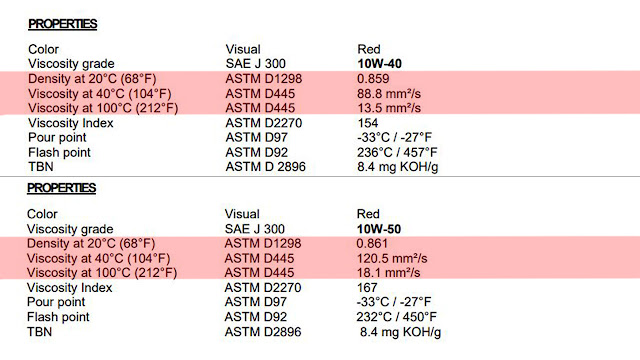- Get link
- X
- Other Apps
10W40 vs 10W50 różnice opisane prostym językiem - 10W40 vs 10W50 differences described in simple language
- Get link
- X
- Other Apps
Motul 7100 4T 10W40 vs Motul 7100 4T 10W50
Wystarczy spojrzeć na karty charakterystyk aby dostrzec największe różnice.
Oleje różnią się delikatnie lepkością w 20°C , ale największe różnice
widać w lepkości kinematycznej w 40°C
i 100°C .
Jeden olej ma za "W" symbol "40" zaś drugi ma za "W" symbol "50". W ostrym skrócie oznacza to olej z "50" ma grubszy film olejowym, który powinien dać lepszą ochroną w wysokich temperaturach.
EN: Just look at the safety data sheets to see the biggest differences.
Oils differ slightly in viscosity at 20°C, but the biggest differences are seen in kinematic viscosity at 40°C and 100°C.
One oil has a "W" for "40" and the other has a "W" for "50". In a nutshell this means oil with a "50" has a thicker oil film, which should give better protection at high temperatures.
Co to jest film olejowy?
Jeśli olej nazwiemy substancją (lepką cieczą) która składa się z milionów kulek, które ułożone obok siebie budują nam łańcuch, to w oleju z "50" te kulki będą miały większą średnice - powiedzmy ten łańcuch będzie grubszy. Im grubsze kulki tym trudniej je spłaszczyć, więc na olej z "50" możemy działać większą siłą, a ten mają grubsze kulki w łańcuchu powinien bardziej przeciwdziałać maksymalnemu spłaszczeniu kulek.
Prostym językiem pisząc, po spłaszczeniu kulek w łańcuchu dochodzi do zjawiska tarcia metal-metal. Olej ma za zadanie nie dopuścić to suchego tarcia, nie dopuścić do sytuacji w której film olejowy się rozerwie. Rozerwanie filmu olejowego to nic innego jak rozdzielenie się kulek w łańcuchu, inaczej pęknięcie łańcucha z kulek.
Patrząc jeszcze na tabele, widzimy jeszcze dużą różnicę w
indeksie, ale nic w tym dziwnego, po prostu oleju 10W50 ma szerszy zakres
pracy. Więcej o indeksie można poczytać tu: https://uszlachetniacze.blogspot.com/2018/11/olej-silnikowy-redukcja-tarcia-engine.html
EN: What is an oil film?
If we call oil a substance (a viscous liquid) that consists of millions of balls that, arranged next to each other, build us a chain, then in oil with "50" these balls will have a larger diameter - let's say this chain will be thicker. The thicker the balls are, the harder it is to flatten them, so we can apply more force to the "50" oil, and this one has thicker balls in the chain should counteract the maximum flattening of the balls.
With a simple tongue, after the balls are flattened in the chain, metal-to-metal friction occurs. Oil is designed to prevent this dry friction, to prevent the oil film from tearing. Bursting of the oil film is nothing more than splitting the balls in the chain, otherwise the chain will break from the balls.
Looking at the tables, we can still see a big difference in the index, but nothing strange about it, just the 10W50 oil has a wider range of work. You can read more about the index here: https://uszlachetniacze.blogspot.com/2018/11/olej-silnikowy-redukcja-tarcia-engine.html
Skoro olej 10W50 jest taki super, to dlaczego niektórzy producenci zalecają używanie oleju 10W40, a nawet 10W30?
Nie każda pompa oleju jest w stanie poradzić sobie z oporem stawianym przez wyższą lepkość - w naszym przypadku większy opór stawia olej z "50". To czy można użyć olej o wyższej lepkości, należy sprawdzić przed jego zastosowaniem, ponieważ to może skończyć się źle dla silnika. Oczywiście, silnik od razu nie padnie, ale z czasem może zacząć pracować głośniej, gdyż praca silnika była utrudniona właśnie przez opór stawiany przez olej.
EN: If 10W50 oil is so great, why do some manufacturers recommend 10W40 or even 10W30 oil?
Not every oil pump can cope with the resistance of a higher viscosity - in our case, the "50" oil is more resistant. Whether it is possible to use an oil with a higher viscosity should be checked before using it, as this could end up badly for the engine. Of course, the engine will not fall off immediately, but over time it may start to work louder, because the engine was hampered by the resistance put up by the oil.
Który olej wybrać 10W40 czy 10W50?
Należy używać oleju zalecanego przez producenta. Jeśli natomiast producent dopuszcza stosowanie w tym samym silniku oleju 10W50, 10W40, to wybór należy do właściciela. Jeśli użytkujemy nasz "pojazd" agresywnie, zalecam użycie oleju 10W50. Jeśli używamy nasz "pojazd" normalnie, czasami mamy ochotę zaszaleć (każdemu się zdarza) zalecam użycie oleju 10W40. Olej 10W40 jest także bardzo dobrym oleju, i to 90% powinno właśnie wybierać tą lepkość.
EN: Which oil to choose 10W40 or 10W50?
Use the oil recommended by the manufacturer. If the manufacturer allows the use of 10W50, 10W40 oil in the same engine, it is the owner's choice. If we use our "vehicle" aggressively, I recommend using 10W50 oil. If we use our "vehicle" normally, sometimes we feel like going crazy (it happens to everyone) I recommend using 10W40 oil. 10W40 oil is also a very good oil, and 90% should choose this viscosity.
10w40 4t
10W40 vs 10W50
10W50 4t
7100 4t
engine oil
motorcycle oil
motul
motul 7100
motul 7100 4t 10W40
motul 7100 4t 10W50
viscosity
- Get link
- X
- Other Apps
Comments

Unastira_bu Kimberly Baloi https://marketplace.visualstudio.com/items?itemName=orinsulno.Descargar-Hybrid-Instinct-gratuita
ReplyDeleteguivanfucu
Vterperdiscya Dave Gomez click
ReplyDeleteclick here
https://colab.research.google.com/drive/1T_D2AJ1o3H2-4dViREXaT5DvrpyABLoA
link
bersanfbingser
monsdaquega Barbara Jones click here
ReplyDeleteFree download
deretotask